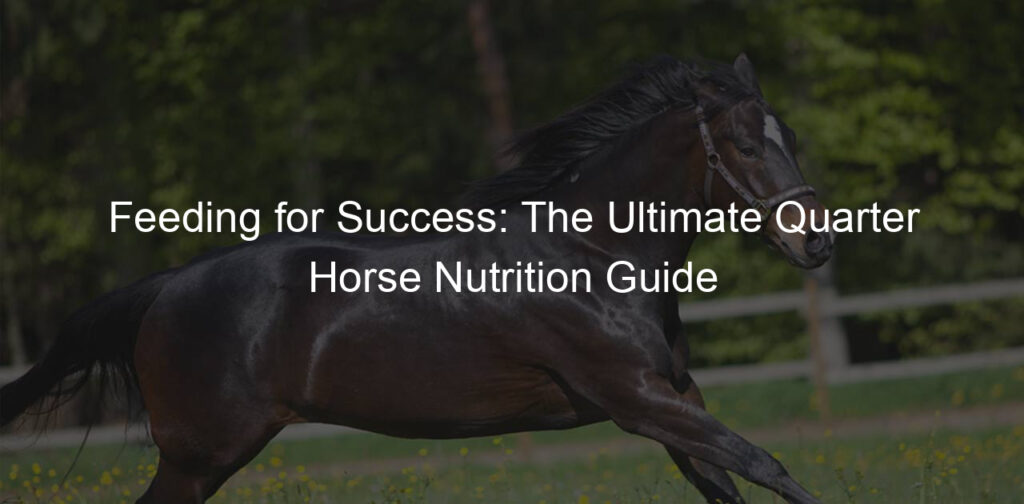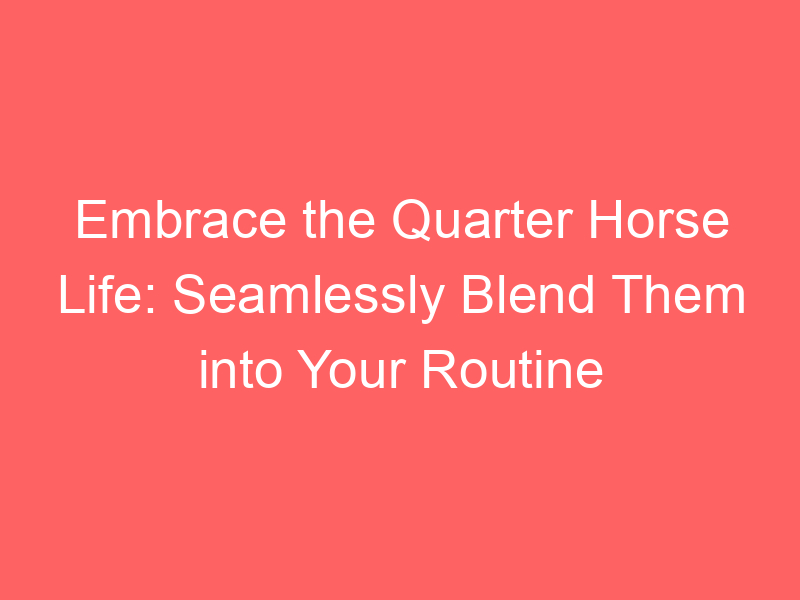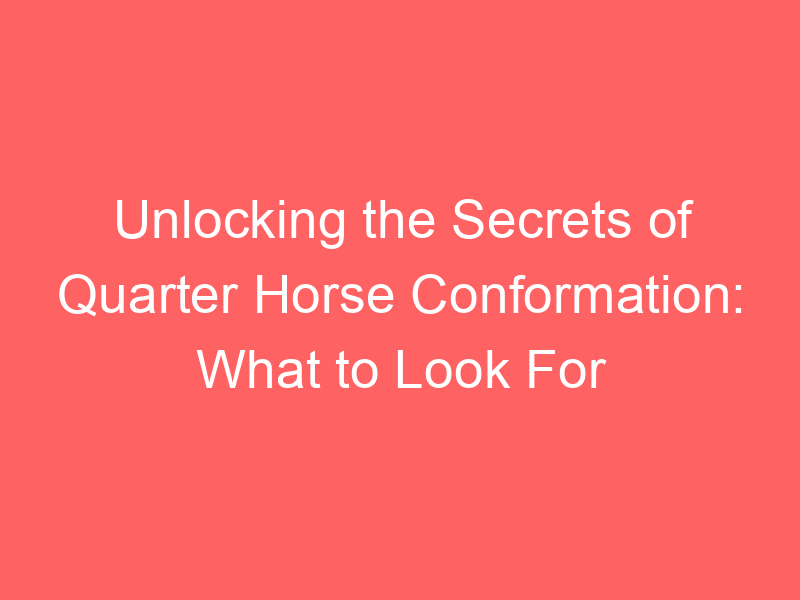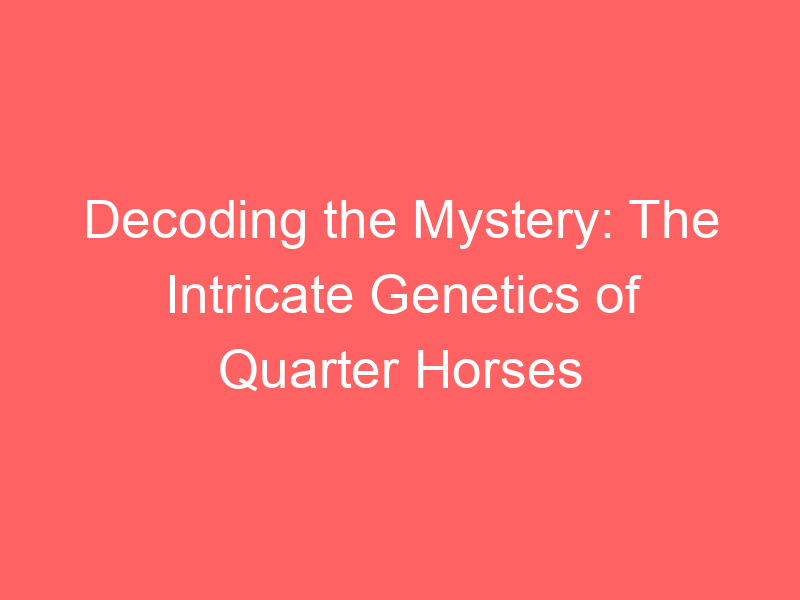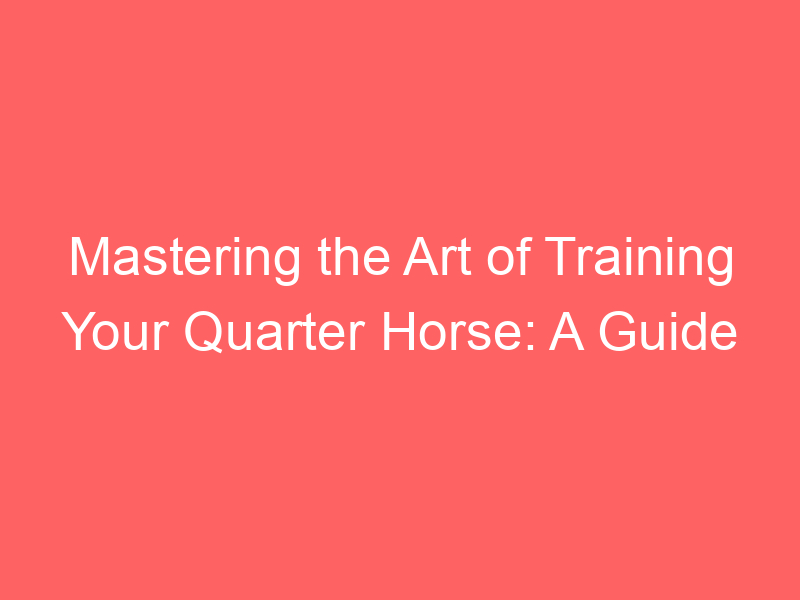Introduction to Quarter Horse Nutrition
Welcome, horse lovers! Today, we’re going to talk about something super important for our four-legged friends – nutrition! Just like us, horses need the right food to stay healthy and strong. And if you’re a fan of Quarter Horses, you’ll want to know all about their special diet.
- Importance of understanding horse nutrition
- Specific dietary needs of Quarter Horses
First off, let’s chat about why horse nutrition is so important. You see, horses are a lot like us. They need a balanced diet to keep their bodies working right. If they don’t get the right nutrients, they can get sick. Plus, different types of horses need different types of food. So, understanding horse nutrition is key to keeping your horse happy and healthy.
Now, let’s talk about Quarter Horses. These guys are super special. They’re known for their speed and agility, which means they need a diet that can keep up with them. Quarter Horses need a good mix of proteins, fats, and carbohydrates. They also need plenty of vitamins and minerals. But don’t worry, we’ll dive into the specifics later on.
So, are you ready to become a horse nutrition expert? Let’s get started!
Understanding Horse Nutrition Basics
Hey there, horse lovers! Let’s dive into the basics of horse nutrition. It’s super important to know what your Quarter Horse needs to stay healthy and happy. So, let’s get started!
Essential Nutrients for Horses
Just like us humans, horses need a balance of certain nutrients to keep them in tip-top shape. Here are the big ones:
- Proteins and amino acids: Proteins are the building blocks of the body. They help with growth, tissue repair, and creating enzymes. Amino acids are the little guys that make up proteins. Horses need 10 essential amino acids in their diet. Learn more about proteins and amino acids here.
- Carbohydrates: Carbs are the main source of energy for horses. They come in two types: structural (found in forage like hay and grass) and non-structural (found in grains). Both are important, but too many non-structural carbs can cause health problems.
- Fats: Fats are another source of energy. They’re also needed for absorbing certain vitamins. Plus, they make the horse’s coat shiny!
- Vitamins and minerals: These are needed for a whole bunch of things, like bone health, blood clotting, and immune function. Horses get most of their vitamins and minerals from forage, but sometimes they need a little extra help from supplements.
- Water: This one’s a no-brainer. Horses need lots of fresh, clean water every day to stay hydrated. In fact, a horse can drink up to 10 gallons of water a day!
And there you have it, the basics of horse nutrition. Remember, every horse is unique and might need a slightly different diet. Always check with a vet or a horse nutrition expert if you’re unsure.
Horse Nutritional Needs
Just like us humans, horses need certain nutrients to stay healthy and strong. Let’s dive into what those are!
- Energy requirements
- Protein requirements
- Mineral requirements
- Vitamin requirements
Horses need energy to run, play, and even just to breathe! This energy comes from the food they eat. The amount of energy a horse needs depends on its size, age, and how much exercise it gets. For example, a big, active horse might need up to 20,000 calories a day! That’s like eating 40 hamburgers!
Protein is super important for horses. It helps them grow strong muscles and healthy hair. Horses usually get protein from eating things like hay and grains. A horse needs about 10% of its diet to be protein. But, just like with energy, bigger or more active horses might need more.
Minerals are tiny things found in food that help a horse’s body work properly. Some important minerals for horses are calcium, phosphorus, and potassium. Horses usually get enough minerals from their food, but sometimes they might need a little extra. This is especially true for young horses that are still growing.
Vitamins are another type of nutrient that horses need. They help with things like digestion and keeping the immune system strong. Horses can get most of the vitamins they need from their food. But, they might need a little extra vitamin E if they don’t get to eat fresh grass.
Remember, every horse is different. So, it’s always a good idea to talk to a vet or a horse nutrition expert to make sure your horse is getting all the nutrients it needs.
Quarter Horse Feeding Guidelines
Feeding your Quarter Horse properly is crucial for their health and happiness. Let’s dive into some of the best practices for feeding these amazing creatures.
Feeding Practices for Quarter Horses
When it comes to feeding your Quarter Horse, there are a few key things to keep in mind:
- Frequency and timing of meals: Quarter Horses, like all horses, have small stomachs relative to their size. This means they need to eat little and often. Ideally, you should feed your horse multiple small meals throughout the day, rather than one or two large ones. This mimics their natural grazing habits and is better for their digestion.
- Portion sizes: The amount of food your Quarter Horse needs will depend on their size, age, and activity level. As a general rule, a horse should eat 1.5% to 2.5% of their body weight in feed each day. For a 1,000-pound Quarter Horse, that’s 15 to 25 pounds of food! But remember, this is just a guideline. Always consult with a vet or equine nutritionist to determine the best diet for your specific horse.
- Types of feed suitable for Quarter Horses: Quarter Horses do well on a diet that’s high in quality forage, like hay or pasture. They can also benefit from grains like oats, corn, and barley, but these should be fed in moderation. Too much grain can lead to health problems like colic and laminitis. Some Quarter Horses may also need supplements to ensure they’re getting all the vitamins and minerals they need.
Feeding your Quarter Horse properly can seem like a big task, but with these guidelines, you’ll be well on your way to ensuring your horse is happy, healthy, and well-fed.
Best Diet for Quarter Horses
When it comes to feeding your Quarter Horse, there are a few key components to consider. Let’s dive in and explore the best diet for these magnificent creatures.
- Forage-based diet
- Supplementing with grains
- Adding vitamins and minerals
- Consideration of special needs
Forage, like hay or pasture grass, should be the mainstay of your Quarter Horse’s diet. It’s what their digestive system is designed to handle best. According to Wikipedia, horses should consume about 1-2% of their body weight in forage each day. That means if your horse weighs 1000 pounds, they should be eating 10-20 pounds of hay or grass!
While forage should make up the bulk of your horse’s diet, grains can be a helpful supplement. They provide extra energy, which can be especially useful for active, working horses. But remember, grains should be fed in moderation. Too much can lead to health problems like colic or laminitis.
Just like us, horses need a balanced diet to stay healthy. That means making sure they’re getting all the necessary vitamins and minerals. Many horse feeds are fortified with these nutrients, but it’s always a good idea to check with your vet or a horse nutrition expert to make sure your horse’s dietary needs are being met.
Every horse is unique, and some may have special dietary needs. For example, older horses may need a diet that’s easier to chew and digest, while horses with certain health conditions may require specific nutrients. Always consult with a vet or equine nutritionist to create a diet plan that’s tailored to your horse’s individual needs.
In conclusion, a healthy diet for a Quarter Horse should be forage-based, supplemented with grains, and balanced with vitamins and minerals. And always remember to consider any special needs your horse may have. Happy feeding!
Equine Diet and Quarter Horse Health
When it comes to the health of a Quarter Horse, diet plays a crucial role. Let’s dive into the impact of diet on Quarter Horse health.
Impact of Diet on Quarter Horse Health
Just like humans, horses also need a balanced diet to stay fit and healthy. The food they eat can have a significant impact on their overall health. Here are a few key points to remember:
- Role of nutrition in maintaining healthy weight: A balanced diet helps a Quarter Horse maintain a healthy weight. Overfeeding can lead to obesity, while underfeeding can result in malnutrition. Both scenarios can lead to serious health issues. According to Wikipedia, a horse’s diet should be composed of 1-2% of their body weight in roughage, such as hay or grass.
- Impact of diet on horse’s energy levels and performance: The diet of a Quarter Horse directly affects its energy levels and performance. A horse that is fed a diet rich in quality proteins, vitamins, and minerals will have higher energy levels and better performance. On the other hand, a horse on a poor diet may lack energy and perform poorly.
- Prevention of health issues through proper diet: A proper diet can help prevent many health issues in Quarter Horses. For instance, feeding your horse a diet low in sugar and starch can help prevent laminitis, a painful condition affecting the horse’s feet. Similarly, a diet rich in fiber can help prevent digestive issues like colic.
In conclusion, a balanced diet is crucial for the health and well-being of a Quarter Horse. By providing your horse with the right nutrients, you can help ensure they stay healthy and perform at their best.
Case Study: Quarter Horse Dietary Needs and Health
- Case study introduction
Let’s take a trip to Sunny Acres, a horse farm in the heart of New York. Here, they have a Quarter Horse named Star who’s been feeling a bit under the weather. Star is a champion in local horse shows, but recently, his energy levels have been low, and he’s lost some weight. The folks at Sunny Acres were worried, so they decided to take a closer look at Star’s diet and health.
- Problem identification
After consulting with a vet, they found out that Star’s diet was the root of his problems. He was not getting enough nutrients and calories from his food. This was affecting his energy levels and causing him to lose weight. It was clear that Star’s diet needed a serious overhaul.
- Solution implementation
The vet suggested a new diet plan for Star. This included more hay, grains, and a special horse feed designed for active Quarter Horses. They also added a daily vitamin and mineral supplement to make sure Star was getting all the nutrients he needed. The team at Sunny Acres was committed to helping Star get back to his old self, so they started the new diet right away.
- Results and key takeaways
After a few weeks on the new diet, Star was back to his energetic self. He gained back the weight he had lost and was performing better than ever at horse shows. The team at Sunny Acres learned a valuable lesson about the importance of a balanced diet for Quarter Horses. They now know that the right food can make a huge difference in a horse’s health and performance.
Conclusion: Equine Nutrition Requirements for a Healthy Quarter Horse
As we wrap up our discussion on Quarter Horse nutrition, let’s take a moment to revisit the key points we’ve covered and understand why they’re so crucial to the health and wellbeing of your horse.
- Recap of Quarter Horse feeding guidelines: We learned that Quarter Horses have unique nutritional needs. They require a diet rich in quality hay, grains, and plenty of fresh water. It’s also important to adjust their diet based on their age, activity level, and overall health. Remember, overfeeding can lead to obesity and other health issues, while underfeeding can result in malnutrition. Therefore, it’s essential to strike the right balance.
- Importance of a balanced equine diet: A balanced diet is key to maintaining a healthy Quarter Horse. This means providing a mix of carbohydrates, proteins, fats, vitamins, and minerals in the right proportions. A balanced diet not only keeps your horse healthy but also ensures they have the energy and stamina for their daily activities. You can consult with a vet or a horse nutritionist to help you design a balanced diet for your horse.
- Final thoughts on Quarter Horse health and nutrition: Proper nutrition is the cornerstone of a healthy and happy Quarter Horse. By understanding and meeting your horse’s nutritional needs, you can ensure they live a long, active, and healthy life. Remember, every horse is unique, so it’s important to monitor your horse’s health and adjust their diet as needed. With the right care and nutrition, your Quarter Horse can thrive.
In conclusion, taking care of a Quarter Horse’s nutritional needs might seem like a daunting task, but with the right knowledge and resources, it can be a rewarding experience. After all, there’s nothing more satisfying than seeing your horse healthy, happy, and full of life.

